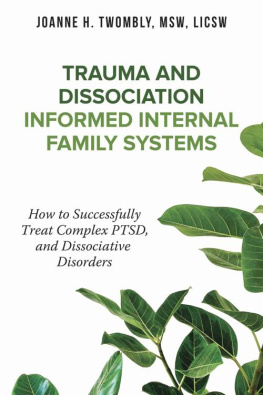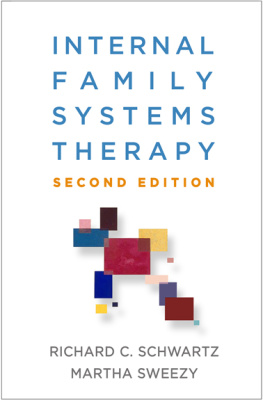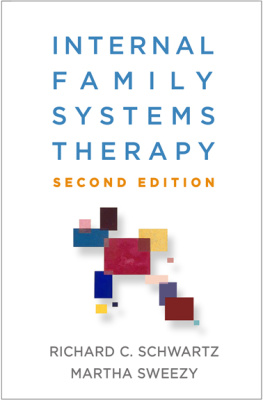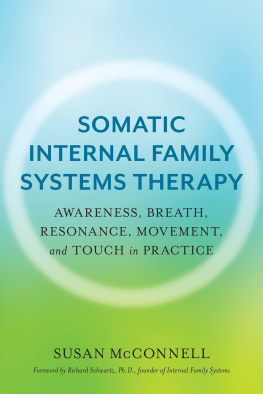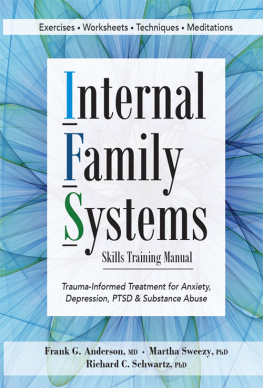
Michael P. Nichols, Series Editor
Alan S. Gurman, Founding Editor
Recent Volumes

INTERNAL FAMILY SYSTEMS THERAPY
Richard C. Schwartz
NORMAL FAMILY PROCESSES, Second Edition
Froma Walsh, EDITOR
CHANGING THE RULES: A CLIENT-DIRECTED APPROACH TO THERAPY
Barry L. Duncan, Andrew D. Solovey, and Gregory S. Rusk
TRANSGENERATIONAL FAMILY THERAPIES
Laura Giat Roberto
THE INTIMACY PARADOX: PERSONAL AUTHORITY IN THE FAMILY SYSTEM
Donald S. Williamson
HUSBANDS, WIVES, AND LOVERS:
THE EMOTIONAL SYSTEM OF THE EXTRAMARITAL AFFAIR
David J. Moultrup
MEN IN THERAPY: THE CHALLENGE OF CHANGE
Richard L. Meth and Robert S. Pasick,
with Barry Gordon, Jo Ann Allen, Larry B. Feldman, and Sylvia Gordon
FAMILY SYSTEMS IN MEDICINE
Christian N. Ramsey, Jr., EDITOR
NEGOTIATING PARENTADOLESCENT CONFLICT:
A BEHAVIORALFAMILY SYSTEMS APPROACH
Arthur L. Robin and Sharon L. Foster
FAMILY TRANSITIONS: CONTINUITY AND CHANGE OVER THE LIFE CYCLE
Celia Jaes Falicov, EDITOR
FAMILIES AND LARGER SYSTEMS:
A FAMILY THERAPISTS GUIDETHROUGH THE LABYRINTH
Evan Imber-Black

Internal
Family Systems
Therapy
Richard C. Schwartz

The Guilford Press
New York London

Epub Edition ISBN: 9781462513956; Kindle Edition ISBN: 9781462513949
1995 The Guilford Press
A Division of Guilford Publications
72 Spring Street, New York, NY 10012
www.guilford.com
All rights reserved
No part of this book may be reproduced, stored in a retrieval system, or transmitted, in any form or by any means, electronic, mechanical, photocopying, microfilming, recording, or otherwise, without written permission from the Publisher.
Last digit is print number: 9 8 7 6 5 4 3 2 1
Library of Congress Cataloging-in-Publication Data
Schwartz, Richard C.
Internal family systems therapy / Richard C. Schwartz.
p. cm. (The Guilford family therapy series)
Includes bibliographical references and index.
ISBN 978-0-89862-273-7ISBN 978-1-57230-272-3 (pbk.)
1. Psychotherapy patientsFamily relationships. 2. Multiple
personality. 3. Psychosynthesis. 4. FamilyPsychological aspects.
5. Family psychotherapy. I. Title. II. Series.
RC489.F33S24 1995

To adequately acknowledge my debt to the people whose help and ideas have influenced the internal family systems (IFS) model would take a book in itself. I am blessed to have encountered many guides along the way, and continue to rely on several of them.
My clients deserve most of the credit for this model, and yet I cannot thank them publicly by name. Often my role has been simply that of a journalist, recording the extrordinary things they discovered and reported to me. I can never fully appreciate the courage it took for many of them to enter and remain in what sometimes seemed an inner chamber of horrors or abyss of despair. They also taught me about my own inner world and how to live in it differently. I recommend that all therapists allow their clients to mentor them in the practice of psychotherapy and the living of life; it is an enlightening and transforming experience.
The colleagues, students, and workshop participants who have influenced the model, sometimes by simply mentioning a book or a method or by challenging an idea or technique that I had reified, are numerous. Some among them have devoted much of their professional energy to the models development and have made special contributions. Deborah Gorman-Smith has been a partner in exploration over the past several years. Her sensitivity to issues facing survivors of sex abuse and to the therapistclient relationship have enriched the model enormously, and her relentless skepticism has kept the model grounded. Regina Goulding has spent countless hours discussing the model with me, helping to clarify and focus it. Ann Womacks clinical creativity has contributed ideas and techniques from the very beginning, and her pioneering efforts in applying it to medical problems have been inspiring. Working with Rich Simon on various projects has challenged and shaped my thinking and writing, adding clarity and depth; in addition, he generously allowed me to use in this book several excerpts of articles I wrote for the Family Therapy Networker. Mike Nicholss advice, editing and support have also been invaluable. My all-too-short time working with Bart Mann was extremely generative, as have been recent discussions with Teresa Jacobson.
Among those who have clarified aspects of the IFS model or pioneered particular applications of it, I wish to recognize Susan Hoke; Annette Hulefeld, Tom Holmes, Paul Ginter, and Nancy Ging; Sharon Pelletier, Barbarra Gould, and Ken Cozzi; Trish Fazzone; Rob Pasick and Nancy Burgoyne; Bob Thorud, Susan Gregory, and the staff of Onarga Academy; Peter Thomas; David Calof; Sandra Watanabe; Dorsey Cartwright; and Joel Van Dyke.
I feel fortunate to have had long-standing relationships with five colleagues who have shaped my thinking, and have also contributed to and supported the development of the IFS model. Doug Breunlin was my partner in our early clinical and intellectual adventures; our collaboration produced the foundation of systemic thought that I later brought to intrapsychic process. In the early 1980s, I learned a great deal from Mary Jo Barretts insights and courage while we struggled together to understand and treat bulimic clients. With considerable foresight, she pointed out the extremes of thought and behavior that plague these clients. Betty Mac Kune-Karrer aided and abetted the development of the model through her unique multicultural perspective and through providing administrative support that freed me to explore. Howard Liddle provided an early appreciation for structural family therapy and a passion for writing. Doug Sprenkle helped me learn to trust my Self and to think more rigorously.
Let me also thank those who aided editorially. It is wonderful to work with an editor who is excited about what you are trying to do, and at The Guilford Press, Suzanne Little grasped the vision of the book and helped shape it. I am very grateful to Seymour Weingarten, who has been more than patient and supportive while he waited for this. I also received useful comments from Michael Huss, Schlomo Ariel, Ted Schwartz, and Alan Gurman.
Finally, I have been blessed to be surrounded by wonderful families (both of origin and of procreation). Gen Schwartzs love and sensitivity have helped me give the same to my internal and external families. Ted Schwartz instilled an insatiable curiosity and mission of compassion that drive me still. He and Gen created an environment of intellectual stimulation that my five brothersSteven, Michael, David, Jonny, and Tommyand I maintain with one another. My daughters, Jessie, Sarah, and Hali, when theyre not saying Get out of here with that parts stuff, Daddy, have been delightfully enchanted with their inner lives and occasionally have let me in on them. Also, they have brought forth parts of me I never knew existed and have learned to love. To my wife, Nancy, I owe the greatest debt. She has tolerated my passion for this model and made sacrifices in my pursuit of it, while also challenging and contributing to it. Over the years our inner protectors have locked horns and hurt each other, but our Selves and many other parts maintain an abiding love. This process has been as healing as it has been educational.
Next page


